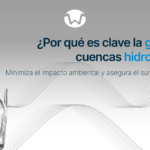
WHAT IS THE UNITED NATIONS SUSTAINABLE DEVELOPMENT GOAL 6 AND WHAT IS IT FOR?
Through the years, man has maintained a development based on the needs of each era, which has led little by little to the deterioration of the world as past generations knew it. At present, the need to make a change is seen, since the population, natural resources, biodiversity and ecosystems are increasingly showing the effects of a not very comprehensive development. Because we must mark a change in favor of a better future, the United Nations (UN) approved in 2015 the 2030 Agenda on Sustainable Development, which sets the guidelines that countries and societies must follow. to start building a new path that benefits everyone without leaving anyone behind.
The 2030 Agenda proposes 17 objectives for Sustainable Development, of which Objective N ° 6 «Clean water and sanitation» will be of our main interest in this blog.
Objective N ° 6 Clean Water and Sanitation
Why is it important? Well, we all know that water is used directly or indirectly by man in his different activities: direct consumption, industrial processes or food production, making it an indispensable resource for life, however, More than 40% of the population in the world has complications in accessing this resource, sometimes being of poor quality and in precarious conditions. On the other hand, more than 80% of wastewater produced by human activity is discharged into rivers, lagoons or the sea without any prior treatment that guarantees the absence of pollutants. Due to this problem, it is necessary to make a substantial change in the management and quality of this important asset.
What are the objectives?
Achieve by 2030 universal and equitable access to drinking water at an affordable price, access to adequate sanitation and hygiene services for all, improve water quality by minimizing pollution, eliminate dumping and minimize the emission of chemical products and hazardous materials, halve the percentage of untreated wastewater and significantly increase recycling and safe reuse globally.
Improve the management of water resources in all sectors and ensure sustainability in the extraction and supply of fresh water by facing the scarcity of this resource and considerably reducing the number of people who suffer from the lack of the precious liquid.
Implement integrated water resources management at all levels, including through cross-border cooperation, as appropriate. Expand international cooperation and support provided to developing countries for the creation of activities and programs related to water and sanitation, such as water harvesting and management, desalination, efficient use of water resources, wastewater treatment, recycling and reuse technologies.
While 2015 to the present year is to protect and restore water-related ecosystems, including forests, mountains, wetlands, rivers, aquifers, and lakes.
Let’s not let them remain only on paper, today more than ever, we are experiencing unexpected situations and changes, which reveal once again the lack of a SO VITAL resource for any human being and our lack of commitment (state – society) with the care and preservation of it. Let’s become aware, let’s accept our mistakes, let’s do our bit, but above all #tomateloenserio, that water is everyone’s right and also, it’s everyone’s duty to take care of it.
In the following link you can find some notable data:
https://www.un.org/sustainabledevelopment/es/water-and-sanitation/



